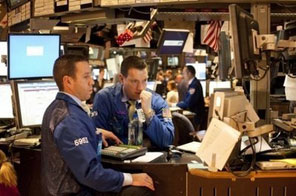Wall Street braces for Dubai debt fallout, jobs data
NEW YORK: Wall Street braced for repercussions of the Dubai debt crisis to unfold and for looming key economic data, after winding down a turbulent holiday-shortened week.
The Dow Jones Industrial Average edged down 0.9 percent on the week to 10,309.92, snapping a three-week streak of gains for blue chips.
The technology-heavy Nasdaq composite tumbled 3.5 percent to 2,138.44 and the broad-market Standard & Poor's 500 index was flat, slipping 0.01 percent to 1,091.49.
Closed Thursday for the Thanksgiving Day holiday, Wall Street reopened for an abbreviated session in the midst of a global market rout triggered by news that Dubai is seeking a debt moratorium.
The Middle Eastern city state announced late Wednesday that its state flagship conglomerate, Dubai World, wanted a six-month standstill on 59 billion dollars in debt, sending markets into a panic over fears of a debt default.
The news wiped out the Wall Street gains made earlier in the week.
"It's not a default yet, it's a small financial crisis, but what we've learned from history is that small financial crises can become bigger financial crises," said Hugh Johnson of Johnson Illington Advisors.
"I wouldn't be surprised to see this situation take more time to be resolved than you might expect -- it does create so many questions," he said, adding that the crisis comes "at a time when some would argue that the market is overvalued."
David Kotok at Cumberland Advisors warned that the Dubai World debt crisis carries "contagion risk."
"Insolvency cannot be permanently papered over by excess liquidity, not in the Middle East nor, for that matter, in America," he said.
The Dow, which had closed Wednesday at its highest level since October 2008, shed only 1.48 percent Friday, although the movement could have been exaggerated amid thin volume as many traders took the day off.
"The real test will be on Monday," said Peter Cardillo of Avalon Partners.
The week began with a roar as investors welcomed a series of economic reports, which "continue to point in the right direction, although most are weakly pointing in the right direction," said Gregori Volokhine of Meeschaert New York.
"As long as the recovery outlook holds, the market will continue to rise or be supported," he said. "One cannot think about a correction when one has the notion that things are going to get better."
Among the positive data, the market in particular appreciated a fall in the weekly number of initial unemployment insurance claims, to below 500,000 for the first time since September 2008.
Analysts said the Dubai crisis would likely be the main topic in the marketplace, as earnings season has ended.
Investors will have a full economic calendar to digest, including the ISM manufacturing index and construction spending on Tuesday, and the Federal Reserve's Beige Book on the economic outlook on Wednesday.
The key monthly unemployment rate and payrolls data caps the week Friday.
Most analysts expect the November jobs data to show the unemployment rate held steady at 10.2 percent, a 26-year high hit in October, with the economy shedding 114,000 jobs, down from 190,000, amid recovery from recession.
The labor report comes as the year-end holiday shopping season shifts into high gear and traders are expected to pore over the numbers for clues on the direction of consumer spending, which drives two-thirds of US economic activity.
"We do not expect an imminent recovery in employment, but the rebound in business profits suggests that labor market deterioration is in its final stages, barring a relapse in financial conditions," said Joseph Brusuelas of Moody's Economy.com.
Bonds gained for the week. The yield on the 10-year Treasury bond fell to 3.211 percent from 3.356 percent a week earlier and that on the 30-year bond dipped to 4.209 percent from 4.295 percent. Bond yields and prices move in opposite directions.






